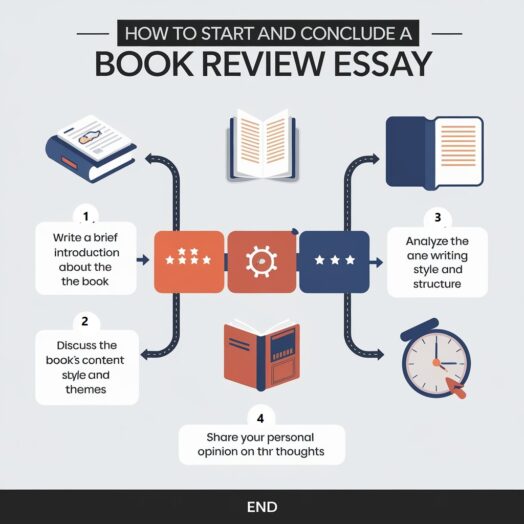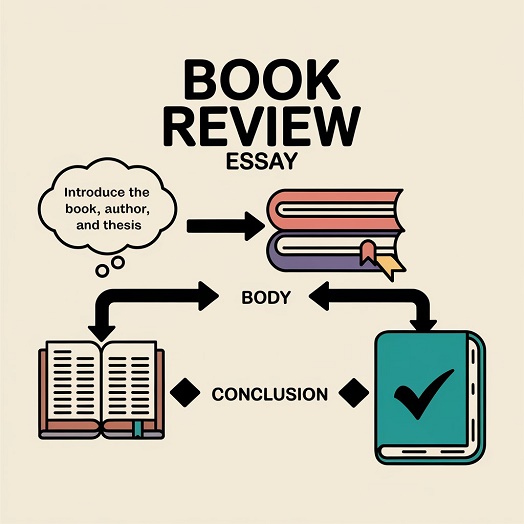Book reviews are an excellent way to share your opinion and insights about a book with others. Whether you’re a student, a book enthusiast, or a writer looking to improve your writing, a well-structured book review essay is an essential skill. Let us look at how to write a strong introduction and conclusion for the book review; this will help you create a compelling and well-supported review for better grades.

How to Write a Strong Book Review Introduction
A well-written introduction is essential for drawing in your reader and setting the stage for a compelling book review. The introduction should provide key background details, establish your perspective, and engage the audience. Check out how to write a substantial book review introduction:
1. Start with a Hook
Your first sentence should immediately grab the reader’s attention. A strong hook can take several forms:
- A thought-provoking question: What if you discovered everything you knew about history was wrong?
- A bold statement: This book redefines the meaning of courage in ways never explored before.
- A striking quote: “It is only with the heart that one can see rightly; what is essential is invisible to the eye.”
The goal of the hook is to make the reader curious and encourage them to continue reading.
2. Provide Context
After capturing attention, provide the necessary background information about the book:
- Title and author: Include the full name of the book and its author.
- Genre and themes: Specify whether fiction or nonfiction and mention key themes.
- Historical or cultural significance: If relevant, highlight the book’s impact, accolades, or why it matters in its field.
For example:
“The Great Gatsby” by F. Scott Fitzgerald is a classic novel that explores the disillusionment of the American Dream in the Roaring Twenties. First published in 1925, the book has since become a staple in literature, renowned for its vivid characters and social critique.
3. Give a Brief Summary
Offer a concise overview of the book’s central premise without giving too much away. In this section, focus on:
- The book’s central argument or storyline.
- Its narrative style or structure.
- Any key elements that define the book (e.g., setting, point of view).
For example:
“The novel follows Jay Gatsby, a wealthy and mysterious man, as he attempts to rekindle his lost love with Daisy Buchanan. Through the eyes of narrator Nick Carraway, Fitzgerald paints a picture of extravagance, love, and moral decay in 1920s America.”
4. Present Your Thesis Statement
Your thesis should reflect your overall evaluation of the book. This is your opportunity to state your main argument, which you will support in the body of the review. Consider:
- Whether the book succeeds in its goals.
- Your overall impression (Is it engaging? Thought-provoking? Flawed?).
- A brief preview of your supporting points.
For example:
“While Fitzgerald’s prose is beautifully poetic, his characters remain deeply flawed, making ‘The Great Gatsby’ both a mesmerizing and tragic critique of ambition and excess.”
5. Engage the Reader
End your introduction with a compelling sentence that encourages the reader to continue. This could be:
- A rhetorical question: But does Gatsby’s story genuinely embody the American Dream—or shatter it beyond repair?
- A hint of your final evaluation: Despite its lyrical beauty, the novel leaves the reader questioning the price of wealth and success.
Following these steps, you’ll write an introduction informing and intriguing you, setting the foundation for a compelling and insightful book review.
Example of a Strong Book Review Introduction
1984 by George Orwell is a haunting exploration of surveillance, censorship, and authoritarian rule. Set in a dystopian society where truth is manipulated, Orwell’s novel remains alarmingly relevant in today’s digital age. With its gripping narrative and profound social commentary, 1984 challenges readers to question the power structures that govern their lives. In this review, I will examine Orwell’s depiction of power and control, analyze his use of symbolism, and assess the novel’s impact on contemporary political discourse.
According to the Purdue Online Writing Lab (OWL), a practical book review should avoid excessive summaries and instead focus on critical analysis. Ensure you establish your main argument before writing your introduction rather than just describing the book’s plot.
Read more on Book review writing Examples

How to Write a Thoughtful Book Review Conclusion
A well-written conclusion is essential to wrapping up your book review effectively. It should not simply restate your points but also reinforce the significance of your analysis. A substantial book review conclusion accomplishes the following:
1. Summarize Your Key Points
Begin by briefly restating the main arguments you made in your review. Avoid repeating everything word-for-word; synthesize your ideas to reinforce your analysis.
For example:
“Throughout this review, we’ve explored how Fitzgerald’s lyrical prose, complex characters, and social critique make ‘The Great Gatsby’ a timeless novel. While its exploration of wealth and ambition remains relevant, the novel’s portrayal of women and moral ambiguity invite deeper discussion.”
2. Offer Your Final Assessment
Clearly state your overall evaluation of the book. Consider addressing:
- The book’s strengths (Was it well-written? Engaging? Informative?)
- Its weaknesses (Did it have flaws in argument, character development, or pacing?)
- The overall impact (Does it achieve its purpose or leave a lasting impression?)
For example:
“Fitzgerald masterfully captures the allure and corruption of the American Dream. However, some readers may find the characters frustratingly shallow, making it a novel that is both compelling and unsettling.”
3. Provide Recommendations
Help your readers determine whether this book is for them by suggesting who would benefit from reading it:
- General readers – for entertainment or personal enrichment.
- Students – for its literary, historical, or thematic significance.
- Scholars and researchers – if it contributes valuable insights to an academic field.
For example:
“This novel is a must-read for literature enthusiasts and students studying themes of identity, wealth, and societal decay. Casual readers may enjoy its poetic writing, but those seeking a hopeful story may find its tragic elements overwhelming.”
4. Reflect on the Book’s Impact
Discuss the book’s broader influence on literature, genre, or contemporary discussions. Consider:
- Does it contribute new insights to its field?
- How does it compare to other works in the same genre?
- Is it still relevant today?
For example:
“Nearly a century after its publication, ‘The Great Gatsby’ remains a defining critique of the American Dream, inspiring countless discussions in literature and sociology. Its themes of ambition, illusion, and societal inequality continue to resonate in modern times.”
5. End with a Memorable Closing Statement
Your final sentence should leave a strong impression. You might:
- Pose a thought-provoking question.
- Provide a call to action (e.g., encourage readers to reflect or engage further).
- Offer a powerful concluding statement.
Example of a Book Review Conclusion
“The Great Gatsby” is more than just a story of lost love and extravagant wealth—it is a profound critique of the American Dream. Throughout this review, I have explored Fitzgerald’s masterful prose, his use of symbolism, and the novel’s enduring themes of ambition and disillusionment. While the novel’s poetic style and vivid imagery make it a literary masterpiece, its morally ambiguous characters and bleak ending may not appeal to all readers.
Despite its tragic undertones, “The Great Gatsby” remains a must-read for literature students, history enthusiasts, and anyone intrigued by the complexities of wealth and aspiration. Its insights into human nature and societal values ensure its place as one of the greatest American novels ever written.
Nearly a century after its publication, the novel still sparks conversations about class, love, and the pursuit of success. Does Gatsby’s story serve as a cautionary tale, or does it merely reflect the inevitable fate of dreamers? That question is what makes this novel timeless—and why it continues to captivate readers today.
Final Thoughts
Writing a book review essay can seem daunting, but following these structured guidelines can create a compelling and insightful analysis. Engage your readers with a strong introduction, support your critique with well-researched arguments, and leave a lasting impression with a thought-provoking conclusion. By incorporating expert-backed strategies and avoiding common pitfalls, your book review will be informative, credible, and valuable to your audience.
Recommended Resources:
Now, pick up that book, start writing, and share your insights with the world!









 Evan John
Evan John
